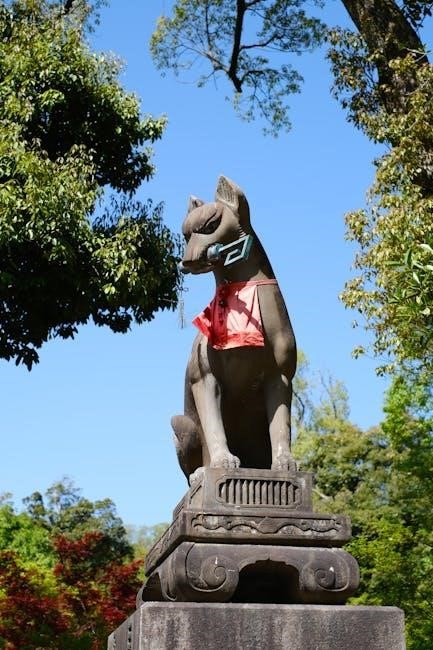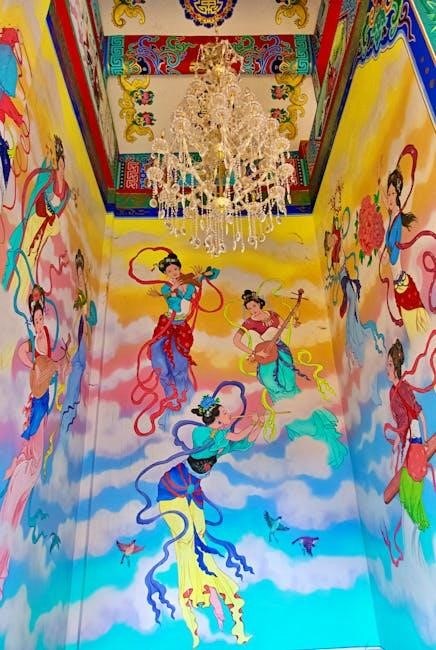Edith Hamilton’s Mythology: Timeless Tales of Gods and Heroes is a seminal work that revitalizes ancient myths for modern readers, blending Greek, Roman, and Norse traditions seamlessly.
1.1 Overview of the Book
Edith Hamilton’s Mythology: Timeless Tales of Gods and Heroes offers a comprehensive exploration of Greek, Roman, and Norse myths. First published in 1942, the book masterfully weaves together stories of gods, heroes, and legendary creatures, providing a clear and engaging narrative. It has become a beloved resource for both casual readers and scholars, selling millions of copies worldwide. The 75th anniversary edition, featuring stunning illustrations, further enhances its appeal. Hamilton’s work bridges ancient traditions with modern understanding, making mythology accessible and relatable for contemporary audiences.
1.2 Importance of Mythology in Modern Times
Mythology remains a vital part of modern culture, offering insights into human nature, ethics, and the universal quest for meaning. Edith Hamilton’s work bridges ancient stories with contemporary relevance, making myths accessible and relatable. Her interpretations highlight timeless themes like heroism, morality, and the struggle between fate and free will. In today’s world, mythology inspires literature, art, and film, while also providing a foundation for understanding cultural roots. Hamilton’s work ensures these timeless tales continue to resonate, enriching modern perspectives and fostering a deeper connection to our shared heritage.

Greek, Roman, and Norse Mythology
Edith Hamilton’s work explores the rich tapestry of Greek, Roman, and Norse myths, highlighting their unique themes and cultural significance while making them accessible to modern readers.
2.1 Key Themes in Greek Mythology
Edith Hamilton’s portrayal of Greek mythology emphasizes themes like heroism, fate, and human nature. Heroes embody courage and sacrifice, while gods illustrate flaws and whims, reflecting human complexity. Myths explore universal truths, blending moral lessons with dramatic narratives. The struggle between fate and free will is central, as seen in stories of Oedipus and Prometheus. Hamilton highlights how Greek myths capture the essence of human existence, blending tragedy, triumph, and the divine, making them timeless and relatable across generations.
2.2 Roman Mythology and Its Influence
Edith Hamilton highlights Roman mythology’s unique blend of Greek influences and original narratives. Roman myths often mirrored Greek stories but with distinct twists, emphasizing civic duty and morality. The adaptation of Greek deities, such as Jupiter (Zeus) and Juno (Hera), reflects Roman cultural priorities. Hamilton underscores how Roman mythology shaped Western literature, law, and governance, leaving a lasting legacy in art, language, and modern consciousness, bridging ancient traditions with contemporary relevance.
2.3 Norse Mythology: Origins and Significance
Edith Hamilton explores Norse mythology, primarily rooted in Icelandic sources like Snorri Sturluson’s 13th-century writings. The Norse pantheon, including Odin, Thor, and Loki, is depicted as complex and often darker than Greek myths. Their stories, centered around Ragnarok and fate, reflect a unique cultural perspective. Hamilton emphasizes how Norse mythology, though less prominent than Greek or Roman, offers profound insights into human nature, destiny, and the cosmos, leaving a lasting impact on literature and modern imagination.

Edith Hamilton’s Approach and Contributions
Edith Hamilton’s work masterfully synthesizes ancient myths, making them accessible to modern readers. Her clear, engaging style demystifies complex narratives, fostering a deeper appreciation for mythology’s timeless relevance.
3.1 Modern Interpretation of Ancient Myths
Edith Hamilton’s work offers a fresh perspective on ancient myths, translating their timeless themes into a modern context. Her interpretations highlight universal human experiences, making the stories relatable and engaging for contemporary readers. By bridging the gap between ancient and modern worlds, Hamilton ensures that mythology remains relevant, resonating with new generations. Her approach emphasizes the enduring appeal of myths, proving their continued significance in understanding human nature and culture;
3.2 Her Role in Popularizing Mythology
Edith Hamilton played a pivotal role in making mythology accessible to a broad audience. Her book simplified complex myths into engaging narratives, appealing to both casual readers and scholars. By presenting the stories in a clear, modern style, she demystified ancient tales, making them relatable and fascinating for the 20th century. Her work remains a cornerstone in popularizing mythology, ensuring its relevance and appeal across generations through its timeless storytelling and enduring themes.

Publication and Popularity
First published in 1942 by Little, Brown and Company, Mythology became a bestseller, selling millions worldwide. Its 75th anniversary edition, stunningly illustrated, continues to enchant readers of all ages.
4.1 First Publication and Reception
Edith Hamilton’s Mythology was first published in 1942 by Little, Brown and Company. The book received widespread acclaim for its accessible and engaging retelling of Greek, Roman, and Norse myths. Critics praised Hamilton’s ability to make ancient stories resonate with modern audiences, establishing the work as a cornerstone of mythology literature. Its initial success marked the beginning of its enduring popularity, solidifying its place as a beloved resource for both casual readers and scholars alike.
4.2 The 75th Anniversary Edition
In 2017, Little, Brown and Company released the 75th anniversary edition of Edith Hamilton’s Mythology, commemorating its enduring legacy. This special edition features stunning illustrations and a refreshed design, making it a captivating tribute to the original work; Designed to enchant both long-time fans and new readers, it maintains Hamilton’s timeless storytelling while appealing to contemporary audiences. The anniversary edition underscores the book’s lasting influence and its continued relevance in exploring the foundation of world literature and culture.
Themes and Analysis
Heroism, fate, and morality are central themes, offering insights into human nature and the timeless relevance of mythological narratives.
5.1 Heroism in Mythology
Heroism in mythology, as explored by Hamilton, often embodies human virtues like courage and sacrifice. Heroes like Hercules and Perseus face extraordinary challenges, showcasing resilience and moral strength. Their stories highlight universal themes, inspiring admiration and reflection. Hamilton emphasizes how these figures, despite flaws, represent ideals of character and perseverance. The concept of heroism transcends time, resonating with readers and illustrating the enduring appeal of mythological narratives in shaping human values and aspirations.
5.2 Fate vs; Free Will in Myths
In Edith Hamilton’s Mythology, the tension between fate and free will is a recurring theme. Greek myths often depict fate as an inevitable force, with the gods and the Fates determining outcomes. Yet, Hamilton highlights how human choices and actions, though bounded by destiny, reveal moral agency and character. This duality underscores the complexity of human existence, where individuals navigate between predetermined paths and personal decisions, illustrating the timeless debate over control and destiny in shaping lives and stories.
5.3 Morality and Human Nature
Edith Hamilton’s Mythology explores the moral complexities of human nature through ancient stories. Myths reveal universal truths about virtues like courage and justice, as well as flaws like ambition and greed. Hamilton underscores how these narratives reflect humanity’s dual nature, blending noble ideals with inherent weaknesses. Her interpretations highlight the enduring relevance of mythological themes, offering insights into moral dilemmas and the human condition. This timeless exploration resonates with readers, bridging ancient wisdom with modern understanding of ethics and behavior.

The PDF Version
Edith Hamilton’s Mythology is widely available in PDF format, offering easy access to timeless tales of gods and heroes. This digital version ensures portability and convenience for readers.
6.1 Availability and Access
Edith Hamilton’s Mythology in PDF format is widely accessible online, available through major eBookstores, libraries, and educational platforms. Readers can easily download or access the PDF from sources like Amazon, Google Books, or academic repositories. This digital version ensures portability, allowing readers to enjoy the timeless tales on various devices. The PDF format also preserves the book’s original structure and content, making it a reliable resource for both casual readers and students of mythology.
6.2 Benefits of the Digital Format
The PDF version of Edith Hamilton’s Mythology offers enhanced accessibility and convenience. Readers can easily search for specific myths, adjust font sizes for readability, and access the text on multiple devices. Hyperlinks and bookmarks enable seamless navigation, while annotations and highlighting tools facilitate deeper engagement. The digital format also reduces physical storage needs, making it eco-friendly. These features make the PDF an ideal choice for both casual readers and scholars seeking a modern, interactive way to explore ancient myths.
Further Reading and Resources
Explore complementary works like Bulfinch’s Mythology and online forums for deeper insights into Edith Hamilton’s interpretations and their cultural impact, enhancing your understanding of mythical narratives globally.
7.1 Related Books on Mythology
Beyond Edith Hamilton’s Mythology, readers can explore Bulfinch’s Mythology for a detailed exploration of Greek and Roman myths. The Epic of Gilgamesh offers ancient Mesopotamian perspectives, while Ovid’s Metamorphoses provides poetic reinterpretations of classical myths. Robert Graves’ The Greek Myths delves into historical and cultural contexts, and Joseph Campbell’s The Hero with a Thousand Faces examines mythological themes across cultures. These works complement Hamilton’s approach, enriching readers’ understanding of mythology’s universal appeal and timeless relevance.
7.2 Online Communities and Discussions
Online communities and forums dedicated to mythology offer vibrant spaces for discussion and exploration. Platforms like Reddit’s r/Mythology and specialized Facebook groups connect enthusiasts worldwide. These spaces allow readers to share insights, ask questions, and delve deeper into myths. Additionally, online resources such as the Myth Made Fact reading series provide further exploration of mythological themes. Engaging with these communities enhances understanding and fosters a deeper appreciation for works like Edith Hamilton’s Mythology, keeping the subject alive and relevant in the digital age.
